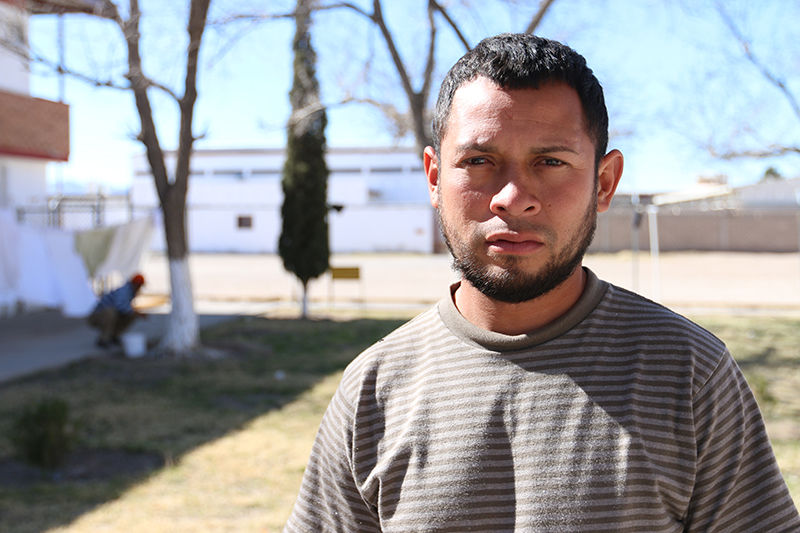CIUDAD JUAREZ, Mexico — Central Americans like Daniel Melgar are the most common residents at the Casa del Migrante, a shelter for immigrants run by the Diocese of Juarez.
Melgar left his family, including his 4-year-old son, in Honduras and headed north in search of a better life. While his story is similar to countless others, the journey through Mexico to the U.S. border hasn’t gotten any easier.
At one point on their journey, if the migrants have managed to elude Mexican law enforcement, they hop on a northbound train.
“On the train, many things happen,” Melgar said. “Kidnapping, gangs get on the train and beat people up, take the little money they have, they kill people and some people die when they fall from the train.”
He made the journey “not to be rich and not to be poor,” he said, but to earn dollars and get ahead and help his family in Honduras. His 75-year-old father lives in Chamalecón, a dangerous Honduran neighborhood run by Mara Salvatrucha, an international gang that began in Los Angeles.
Melgar and other residents of the Casa Migrante had a special seat at the Feb. 17 papal Mass on the U.S.-Mexico border. Pope Francis requested that more than 2,000 immigrants be welcomed at the Mass in Juarez, where he made his last stop on his visit to Mexico this month.
“The human tragedy that is forced migration is a global phenomenon today,” Pope Francis said in his homily. “This crisis, which can be measured in numbers and statistics, we want instead to measure with names, stories, families. They are the brothers and sisters of those expelled by poverty and violence, by drug trafficking and criminal organizations.”
More than 200,000 gathered for the Mass on the Juarez fairgrounds, with an additional 30,000 gathered at the Sun Bowl Stadium at the University of El Paso, participating via livestream. Those on the Mexico side arrived well before Mass began, standing for hours in the vast dirt field under the sun.
The crowd roared as the popemobile made its way through the streets of Juarez and into the dirt field just south of the Rio Grande. Pope Francis stopped and prayed before a large cross just a few yards from the U.S.-Mexico border before Mass began.
The Holy Father, recalling the plight of immigrants who died crossing the border illegally, laid a wreath and blessed three small crosses for the Juarez, El Paso and Las Cruces dioceses.
“The city which was the murder capital of the world now has the world’s attention for another reason,” said Father Javier Calvillo Salazar, director of the Casa del Migrante. “One thing is the logic of the world, and another the logic of God. It’s a great blessing.”
Along with Central Americans, Father Calvillo Salazar also noted the center houses unaccompanied children, immigrants deported from the United States and individuals and families that flee violence in other Mexican states.
“The number of immigrants we’re seeing keeps going up, little by little, as things in the city are safer,” he said. In addition to the Casa del Migrante, several other parishes in the area also help.
Still, Father Calvillo Salazar expects the Church to do more.
“The Church has been too quiet,” he said. “She hasn’t been close enough to the migrant. She’s been cold with these people who are suffering.”
José Luis López Asila is grateful for the welcome he’s received at the center for immigrants. López Asila was deported from Los Angeles six years ago after firing a new gun he had purchased.
“I’d already fixed my paperwork and everything,” he said. “I was drinking and I just wanted to hear it fire. I haven’t seen my family for six years now.”
His son is 10 and his daughter is 11. He came to Juarez wanting to cross the border illegally, but his mother talked him out of it. She said it wasn’t worth the risk.
The U.S. government ruled that he couldn’t come into the country for 10 years, and if he got caught, the time would be extended. He’s decided to return to Zacatecas and wait the remaining four years.
“What a coincidence that the pope is here,” he said, adding that he would be at the papal Mass.
“Being faced with so many legal vacuums, [immigrants] get caught up in a web that ensnares and always destroys the poorest,” the pope said in his homily. “Let us together ask our God for the gift of conversion. … This time for conversion, this time for salvation, is the time for mercy.”

